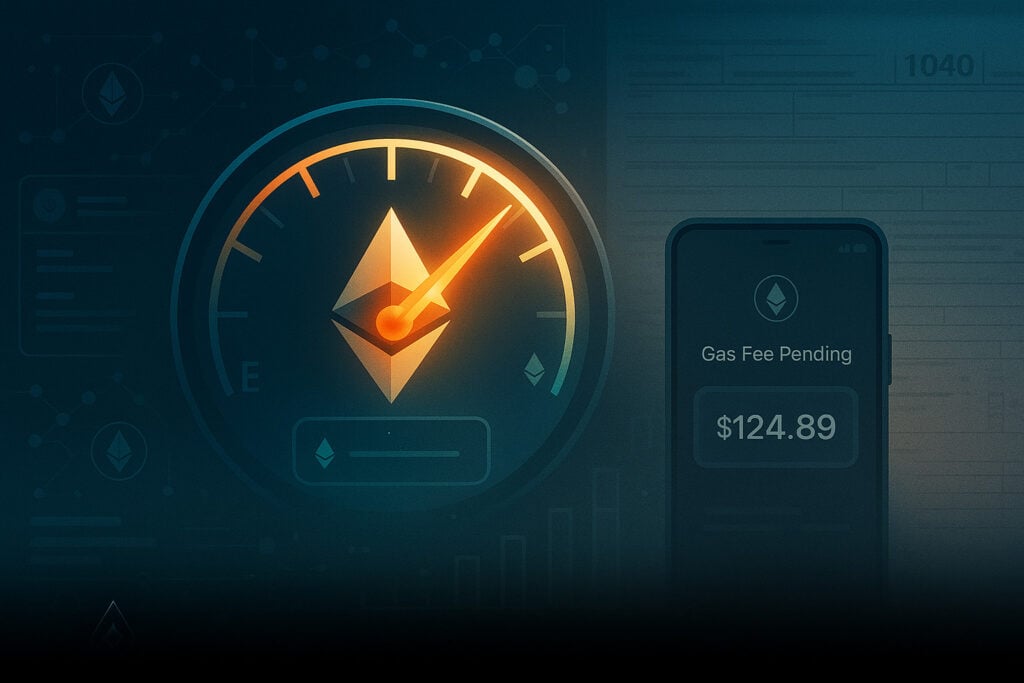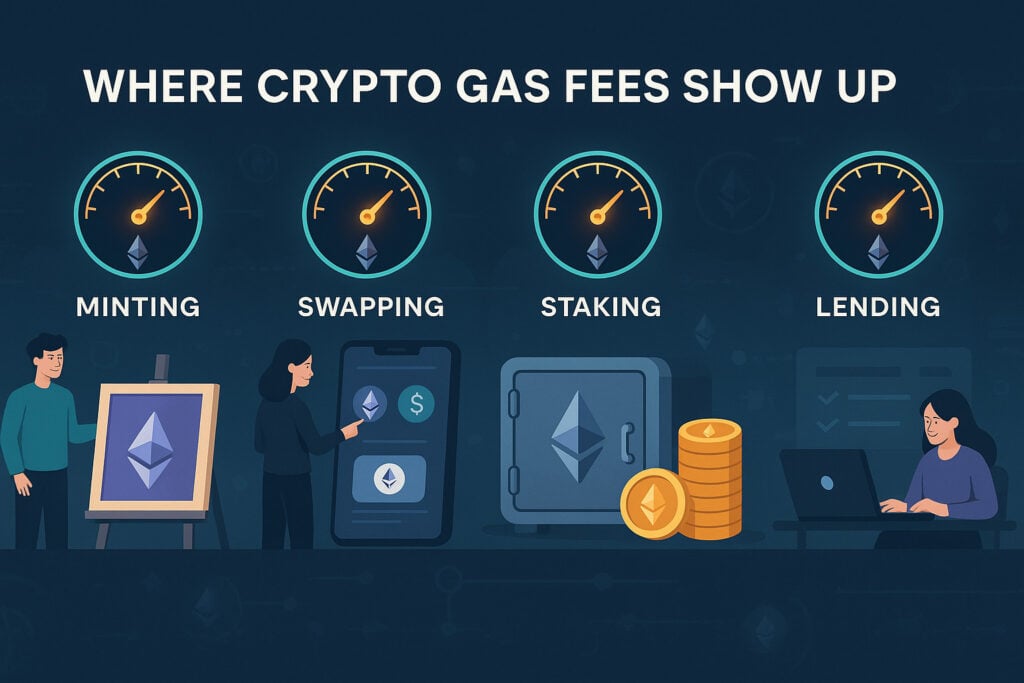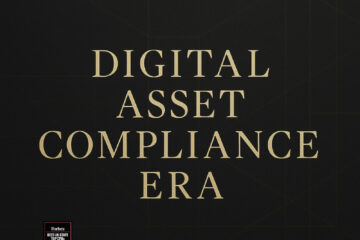Last Updated on September 25, 2025 by Patrick Camuso, CPA
As the digital asset economy scales across chains and protocols, crypto gas fees have become a meaningful cost for serious participants. High-frequency traders, NFT creators, DAO contributors, and DeFi power users often spend thousands of dollars annually on gas. These fees are the backbone of network activity, from token swaps and bridging to staking and airdrop claims.
This evolving ecosystem has forced a new tax question into the mainstream: can these costs be written off? Depending on the activity, gas fees may be deductible, capitalizable, or neither. The IRS has not issued crypto-specific gas guidance, but conventional principles from IRS Publication 544 (Sales and Other Dispositions of Assets) and IRS Schedule C instructions can be applied when structured correctly.

What Are Gas Fees in Crypto, and Why Do They Matter for Taxes?
Gas fees are native transaction costs paid to validators to record activity on a blockchain. They are typically denominated in the base asset (such as ETH or MATIC) and vary depending on network congestion and the complexity of the transaction. For tax purposes, they present two key effects: they reduce the net value of a transaction, and when paid in crypto, they trigger a disposal event, which must be reported.
For example, swapping 1 ETH for 2,000 USDC and paying 0.005 ETH in gas means you have disposed of that 0.005 ETH and acquired the USDC at a total cost that includes the value of gas. This nuance often goes overlooked but is essential to precise reporting.
IRS Treatment: The Two Paths, Investor vs. Business Use
Under current U.S. tax law, personal investors cannot deduct crypto gas fees as expenses, but they may adjust the cost basis of an asset using transaction-related fees. This logic is based on IRS Cost Basis rules (Publication 551), which allow acquisition costs to be included in basis calculations. The gas fee in this case functions similarly to a brokerage fee in traditional finance.
For business users, those operating as freelancers, DAO contributors, or Web3 founders, gas fees incurred for income-producing activities may be deducted as ordinary and necessary business expenses. The IRS Schedule C instructions and Section 162 of the Internal Revenue Code support this deduction, provided that expenses are clearly related to business operations and properly documented.
Wallet separation is critical. Co-mingling personal NFT purchases and DAO revenue-sharing into a single wallet weakens any claim of business activity.
If you operate a Web3 business or earn crypto income through DAO contributions, check out our Web3 Accounting for Founders service to ensure you’re deducting gas fees and structuring wallet activity properly.
How Gas Fees Are Treated in Common Crypto Activities
When swapping tokens, gas fees are typically capitalized into the cost of the new asset. If gas is paid in crypto, that portion is considered sold and must be reported as such. The disposal amount should reflect the market price of the token used at the time of the transaction. This aligns with the IRS’s position that using property to pay for services constitutes a taxable event (IRS Notice 2014-21).
DeFi-related actions, like claiming rewards, compounding LP positions, or harvesting yield, create similar treatment. The gas fee can generally be added to the cost basis of the newly received tokens. However, this must be tracked precisely, with documentation showing the relationship between the gas expense and the acquired asset.
Bridge transactions are less clear. While wallet-to-wallet transfers (between self-controlled addresses) are non-taxable, bridging between chains introduces ambiguity. If bridging is in support of an investment or position acquisition, some professionals adjust the basis accordingly, but this is an aggressive stance and should be accompanied by strong narrative documentation and transaction records.

International Guidance: Where the Rules Are Clearer
The IRS has yet to issue explicit gas fee guidance, but other jurisdictions have taken clearer positions.
In the United Kingdom, HMRC allows incidental costs (including gas fees) to be used to adjust acquisition or disposal values, provided they are wholly and exclusively for the transaction (per HMRC CRYPTO21450). Canada follows a similar path, recognizing gas fees as part of the adjusted cost base (ACB), as stated by the Canada Revenue Agency in their official crypto guidelines. Australia’s ATO guidance suggests that gas may be deductible or included in basis depending on the transaction’s nature and tax intent. Singapore generally does not allow such deductions under its current interpretation of crypto as a non-income-producing asset unless specific business structures are in place.
How to Report Crypto Gas Fees Correctly
Start by classifying your activity as investment- or business-related. From there, apply one of two treatments: cost basis adjustment or business expense deduction.
For investment activity, adjust the basis of the acquired token using the USD value of the gas fee at the time of the transaction. When gas is paid with crypto, record that amount as a separate disposal on Form 8949, using its fair market value on the transaction date. For business activity, deduct crypto gas fees as operating expenses on Schedule C (or corporate returns), with proper receipts and transaction logs.
Use wallet tagging, transaction IDs, and downloadable records from block explorers or tax software to support each claim. Audit defense relies on data completeness, not estimates.
To simplify reporting, you may consider reading our Guide to Cryptocurrency Tax Preparation, which outlines these workflows in detail.
Common Mistakes to Avoid
Failing to report ETH used for gas as a taxable disposal is the most frequent oversight. Many users also forget to adjust cost basis on received assets, leading to inflated capital gains. Using one wallet for both personal and business transactions is another high-risk practice, especially if attempting to deduct fees. Finally, deducting crypto gas fees without evidence, especially for aggressive bridging or failed transactions, creates exposure in the event of a tax review.
The IRS may not publish targeted enforcement rules for these cases, but the burden of proof lies with the taxpayer. Clean documentation and adherence to existing frameworks are key.

Frequently Asked Questions
Q: What is SegFIFO and how does it improve crypto tax reporting?
A: SegFIFO is a proprietary tax optimization strategy developed by Camuso CPA. It segments crypto transactions by wallet and transaction type, allowing for optimized tax lot selection, improved loss harvesting, and better audit defensibility. This system is especially effective for high-frequency traders and Web3 operators using multiple wallets.
Q: Can I deduct crypto gas fees from wallet-to-wallet transfers?
A: Generally no. Wallet transfers between your own wallets are non-taxable and the crypto gas fees are not deductible or added to cost basis unless clearly tied to an investment acquisition or business transaction.
Q: If I pay gas in ETH, do I have to report that as a taxable event?
A: Yes. Paying gas with ETH constitutes a disposal of property under IRS guidance. The fair market value of the ETH used at the time of the transaction must be reported as a sale.
Q: Are crypto gas fees deductible for DAO contributors or freelancers?
A: If your activity qualifies as a business or self-employment, crypto gas fees may be deductible as ordinary business expenses. Clear documentation of business purpose and wallet segregation is essential.
Q: Do other countries allow gas fee deductions?
A: Several do. The UK, Canada, and Australia allow crypto gas fees to adjust your cost basis. Singapore generally does not permit such deductions unless it qualifies as a business expense under their rules.
Q: What if I forget to report gas or fail to track it properly?
A: You may overstate your capital gains or miss valid deductions. It also increases the risk of errors in your return that could trigger an audit. Consistent logging and using crypto tax software can help mitigate this.
Key Takeaways
- Crypto gas fees are not inherently deductible unless used in a business context, but they often affect your cost basis.
- Any gas paid in crypto counts as a taxable disposal, even if it seems like a minor transaction.
- Accurate classification between investment and business activity is essential.
- International rules vary, but many countries allow crypto gas fees to adjust cost basis.
- Poor wallet hygiene, unlogged gas costs, or failure to track USD values can cause compliance problems.
Reference-Backed Insights: Gas Fee Taxation in Law and Practice
To ensure this guide is grounded in verified standards, here is a summary of legitimate positions, with direct links to source documents and authority-backed interpretations:
- IRS Treatment of Crypto Disposals
Using crypto to pay for anything is a taxable event
IRS Notice 2014-21 - Including Transaction Costs in Cost Basis
Acquisition costs can be included in basis for capital gains reporting
IRS Publication 551 - Crypto Gas Fees and Capital Gains in the UK
Crypto gas fees may be added to the cost of acquiring or disposing of tokens
HMRC Manual CRYPTO21450 - Canada’s Tax View on Crypto Transaction Fees
Transaction fees like gas form part of Adjusted Cost Base (ACB)
CRA Crypto Guidance - Australian Tax Office on Crypto Fees
Fees may be included in cost base or deducted, depending on use
ATO Guide to Cryptocurrency
Final Considerations
Crypto gas fees, when tracked and reported with precision, can be a meaningful lever for tax optimization. Whether your goal is to minimize capital gains, deduct operational costs, or simply defend your reporting position, correct gas fee treatment is foundational. For clients operating in multi-wallet, high-transaction environments, tools like SegFIFO, our proprietary transaction structuring method, help segment activity across wallets and intent types, simplifying compliance and maximizing tax efficiency.
At Camuso CPA, we specialize in building audit-resilient tax systems for crypto-native professionals. If your portfolio or business relies on crypto infrastructure, you cannot afford to treat crypto gas fees as incidental. They’re strategic, and we treat them that way.
Next Steps
Schedule a private consultation with our crypto tax team to review your reporting strategy. Download our 2025 Crypto Tax Survival Checklist or explore our Definitive Guide to Cryptocurrency Taxation for a deeper dive into structures, tools, and compliance best practices.
Explore Our Services





